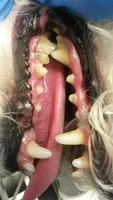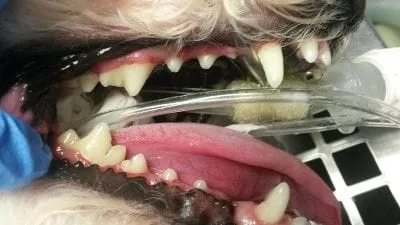Periodontal Disease 
More than 80-85% of dogs and cats, over the age of 1 year, have signs of periodontal disease. Periodontal disease begins when bacteria in the mouth form a substance called plaque. The plaque then sticks to the surface of the teeth and hardens into tartar from minerals in the saliva. This can cause further issues such as gingivitis, gum recession, attachment loss and bad breath. What most owners don’t know is that these problems can cause problems throughout the body, such as kidney or liver disease and complications in the heart. In the wild, showing pain is a sign of weakness and vulnerability, so our pets have evolved the ability to be really good at hiding even serious pain. Just because we don’t see it, doesn’t mean it’s not there. It is important to take periodontal disease seriously as this can be very painful.
Symptoms
- Bad breath
- Weight loss/change in eating habits
- Bleeding gums
- Abnormal drooling
Is my pet at risk?
All pets are at risk for dental disease as our pets do not have control over their dental hygiene. Small breed dogs and cats are most prone to severe periodontal disease due to overcrowding and rotation of teeth. Older animals can also experience severe periodontal disease due to the years of tartar buildup, and perhaps fractured teeth due to chewing inappropriate though toys, sticks, rocks, etc.
Prevention
It is ideal that all owners brush their pet’s teeth daily; however, we know that this can be a challenge. It is much easier to prevent periodontal disease when home care is started early in life. There are many products and diets that can help reduce and/or prevent periodontal disease.
- Water additives (placing tablets into water bowls containing antimicrobial agents)
- Dental chews (i.e. C.E.T. Hextra Chews)
- T/D Oral Health Prescription Diet
- Royal Canin Dental Diet
- Dentistry (performed by your veterinary team)
What is involved in dentistry?
Since dogs and cats won’t sit and quietly say ahhh…they need to undergo a full anesthetic. Our dentals include pre-anesthetic bloodwork and intra-operative IV fluids. The bloodwork helps us to evaluate if your furry friend is healthy enough to undergo the anesthesia and then I.V. fluid administration is used to maintain blood pressure and allow for a smoother recovery. Our Registered Veterinary Technicians will then complete a full oral examination, scale and polish teeth and report any issues to the veterinarian. Sometimes, teeth have to be extracted due to loss of attachment, fractures, recession or discomfort to the animal.

Before cleaning


